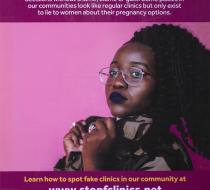Health Care Not Wealth Care: Posters on Health Activism and Social Justice Favorite
The Center for the Study of Political Graphics and the Esperanza Community Housing Corporation have combined forces to bring 75 powerful and engaging poster works on broad issues of health care to audiences traditionally excluded from the art world in Los Angeles and elsewhere. Both organizations have been in the forefront of social change for three decades. Their missions are different, but they overlap in ways that encourage vigorous artistic expression with socially conscious content.
The Center for the Study of Political Graphics, the originator of the stunning bilingual show—on display at Mercado La Paloma in South Central Los Angeles through Sunday—has been collecting, preserving and exhibiting political posters on numerous themes throughout the country and internationally for many years. Its focus has been on posters from historical and contemporary movements for social change. Its exhibitions promote the power of art to educate and inspire people to social action.
Arts and culture are a core component of Esperanza’s institutional social justice mandate. The organization empowers local artists, sponsors festivals and offers art exhibitions throughout the year, including the current one, titled “Health Care Not Wealth Care: Posters on Health Activism and Social Justice.” It encompasses yet far transcends the rallying cry of health care for all, as important as that goal is in a nation where millions of residents lack even the rudiments of medical, dental and psychological coverage. The partnership of both organizations enables market visitors to enjoy and contemplate the political messages of the posters as they sit at tables eating their meals. The exhibition begins with a quotation from Martin Luther King Jr., in English and Spanish, that sets the tone for all that follow: “Of all the forms of inequality, injustice in health care is the most shocking and inhumane.”
The exhibition includes posters from such renowned artists as Robbie Conal, Doug Minkler, Mariona Barkus, Seth Tobocman, the Guerrilla Girls and Klaus Staeck. Its thematic range and comprehensive coverage make it unique among exhibitions focusing on medical and health care issues.
Some of the posters focus on a theme often neglected in contemporary debates about health care: gun violence. Especially in South Central Los Angeles and similar low-income communities, where shootings are an unfortunate daily occurrence, this problem needs to be recognized as a public health crisis. As Mariona Barkus reveals in her 2018 poster, the American Academy of Pediatrics called gun violence the third leading cause of death for children. Her poster and others in the show remind viewers that this problem needs to be solved.
Domestic violence is another profound feature of health care that needs to be addressed. Three heartbreaking posters, one in Spanish, drive the point home. The artworks reveal the devastating effects of domestic violence on women, and especially on mothers and their children. This scourge, to be sure, affects the populations that regularly visit Mercado La Paloma, but it also cuts across racial and class lines throughout the nation. These posters are vivid visual reminders of a crisis enveloped in the fog of taboo and denial.
Uniting all the diverse themes of these vibrant poster artworks is the demand for health care for everyone. The exhibition recognizes, explicitly and implicitly, the issue of health as a human right and its American corollary—“Medicare for All.” Patrons of Mercado La Paloma and casual viewers of “Health Care Not Wealth Care: Posters on Health Activism and Social Justice” are encouraged to reflect on the present inadequacies of our medical system and to mobilize politically to change it.
In addition to inadequate health care, progressives must recognize and address the fundamental underlying problems of American corporate capitalism: the prison-industrial complex, police misconduct, unnecessary war and out-of-control militarism, seemingly intractable racism, sexism and homophobia, profound disparities of wealth and power and inadequate educational opportunities.
Art, throughout history, has played a major role in generating consciousness of grave social, political and economic ills. Both the Esperanza Community Housing Corporation and the Center for the Study of Political Graphics, through their past, present and future exhibitions, play an indispensable part in this process.







